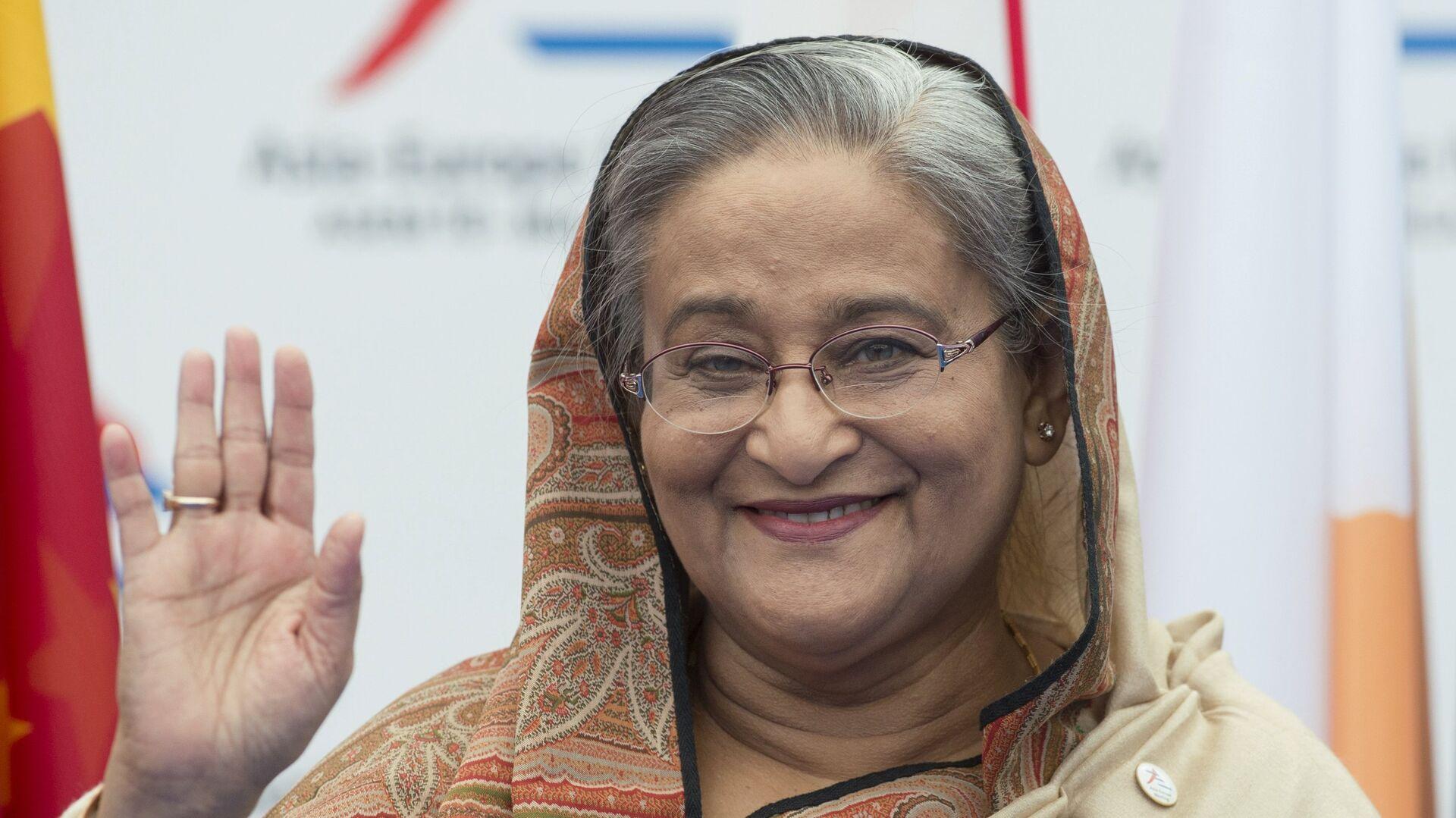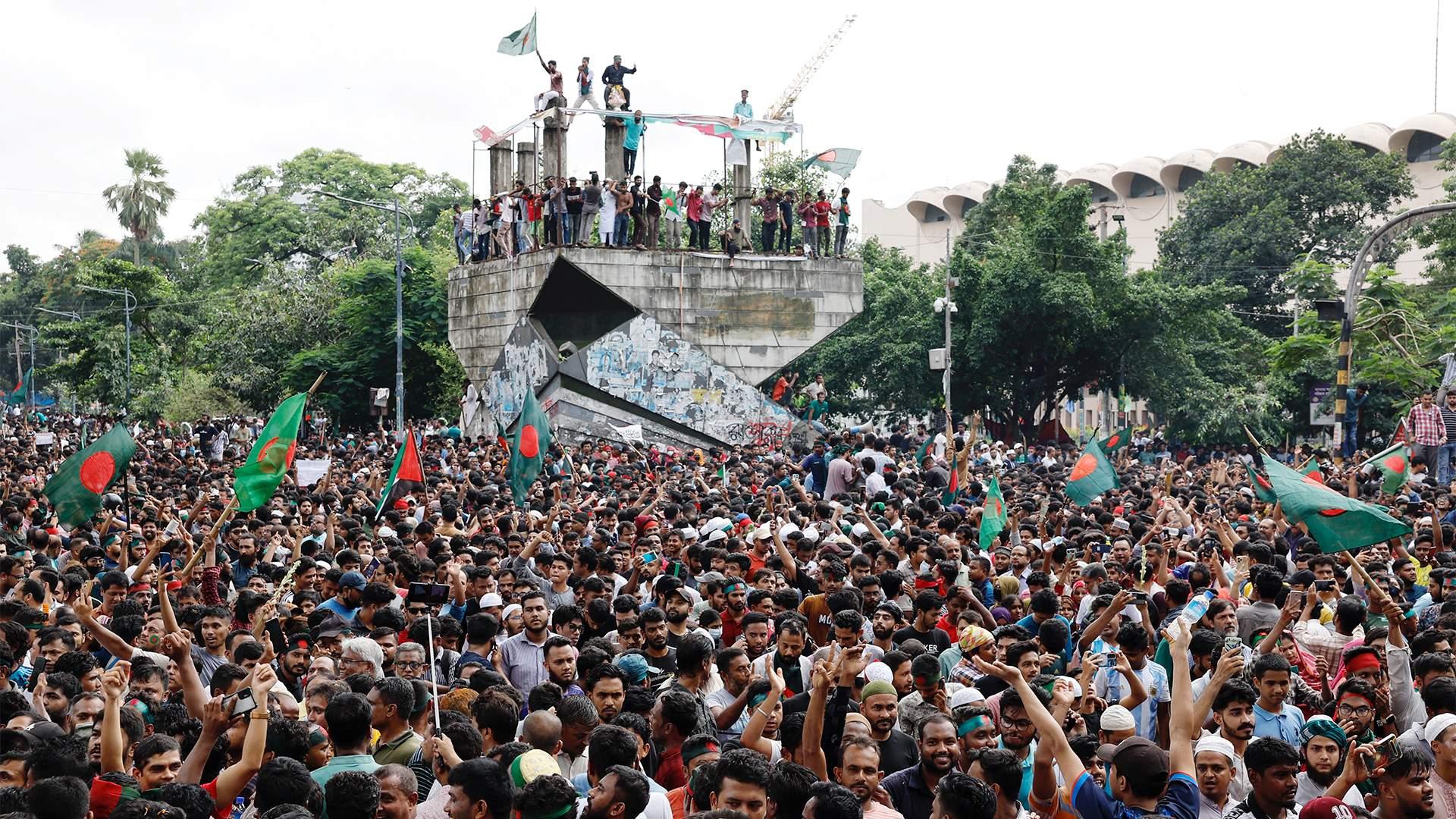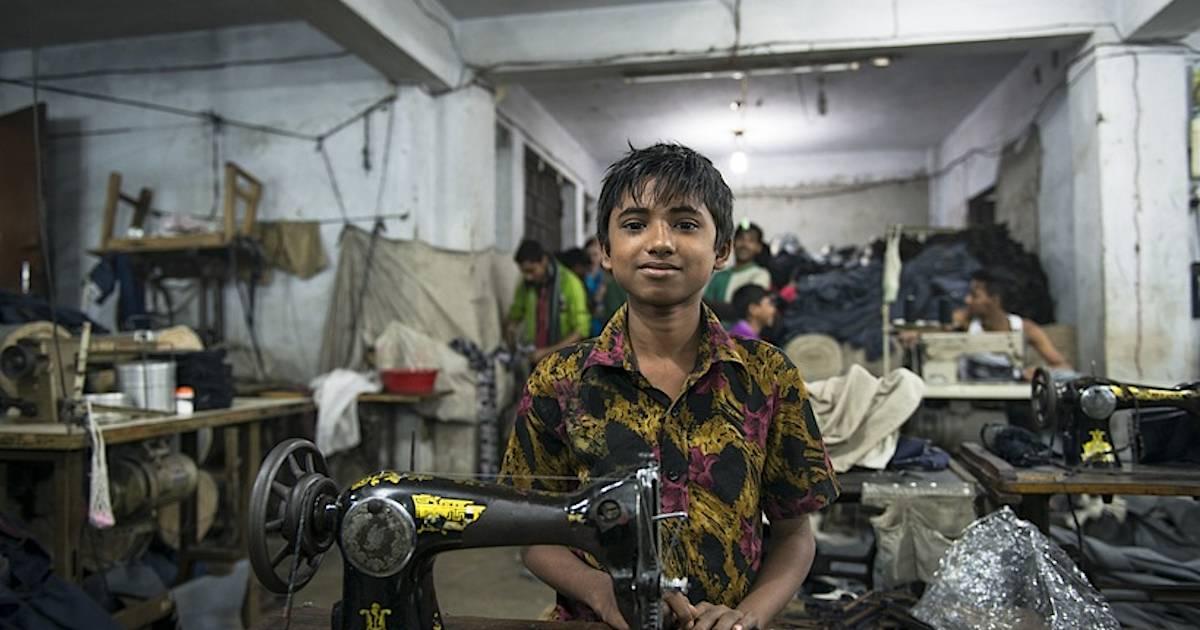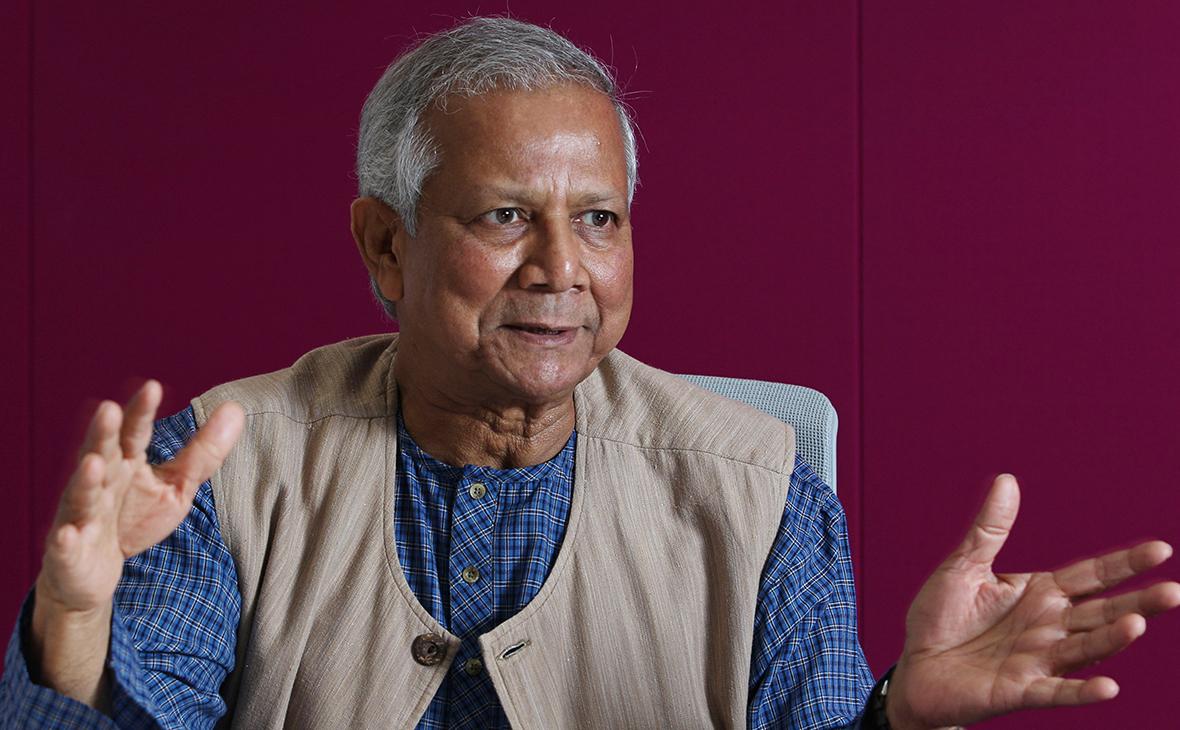The fall of Dhaka’s longest-serving leader What lies ahead for Bangladesh?
The intense confrontations in Dhaka and other Bangladeshi cities between demonstrators and the former government culminated in the flight of Prime Minister Sheikh Hasina and a de facto victory for the protesters. What does the future hold for the country?
The street protests in Bangladesh were triggered by a Supreme Court decision reinstating a 30-per cent quota for government positions reserved for the descendants of the Mukti Bahini. The Mukti Bahini were the guerrilla forces that began armed resistance against the East Pakistani authorities in 1971, leading to the creation of Bangladesh. This designation also included Indian Army personnel who fought alongside the Bengali rebels against Pakistan.
These quotas for Mukti Bahini descendants were abolished in 2018 following youth protests, but they were reintroduced this summer. Bangladesh has a complex system for distributing government jobs. In addition to the 30-per cent quota for Mukti Bahini descendants, there are 10-per cent quotas for underdeveloped regions, 10-per cent for women, 5-per cent for national minorities, and 1-per cent for people with disabilities. Only 44 per cent of positions are filled based on merit. While this system may appear politically correct, many view the quotas for the descendants of "Liberation Army" veterans as unwarranted privileges, bordering on caste-like discrimination. This has particularly frustrated students, as the quotas often obstruct their chances of securing government jobs despite their academic and professional achievements.
Since 2008, Bangladesh has been under the leadership of Sheikh Hasina Wazed, head of the ruling Awami League party and daughter of Sheikh Mujibur Rahman, one of Bangladesh's founders and a figure commemorated with monuments throughout the country.

Apart from quotas, the people of Bangladesh have many other dire problems. Despite the rapid growth in macroeconomic indicators, Bangladesh remains one of the poorest countries in Asia, with the majority of its people living in egregiously poor conditions. But more on that later.
Point-blank shooting
Student protests began on July 1. According to Al Jazeera, the outrage among students protesting against quotas was intensified by an insulting remark from Prime Minister Hasina, who called them "razakars." This term was used derogatorily for those who collaborated with the Pakistani army during the war. On July 15, people armed with metal rods, sticks, and revolvers attacked a peaceful student demonstration at Dhaka University. Similar attacks and beatings of students occurred across the country over the next few hours. It is suspected that the "Chhatra League," the youth wing of the ruling "Awami League," was behind these assaults. On July 16, police used batons and tear gas to disperse protesting students at Begum Rokeya University in Rangpur. During this crackdown, 25-year-old student Abu Syed was killed by several point-blank shots. Soon, the death toll rose to dozens. Journalists and random passersby were also targeted. In response to police violence, protesters began to resist as well.
On July 18, internet services were cut off in Bangladesh, and on July 19, a curfew was imposed. All universities were also closed. Besides the police, the Rapid Action Battalion (RAB), the Bangladesh Border Guard, and the army joined in dispersing demonstrations and patrolling. In less than 10 days, around 200 people were killed in Bangladesh. Approximately 1,000 were injured, 2,500 were arrested, and various charges were filed against 61,000 people. Among other things, a video was released showing a protester dragging his injured comrade while a police officer approached and shot the wounded person at close range.
Under pressure from mass protests, on July 21, the Supreme Court reduced the quota for descendants of Mukti Bahini from 30per cent to 5per cent. The 2per cent quota for ethnic minorities, transgender people, and people with disabilities was retained. The remaining 93per cent of positions were to be allocated to Bangladeshis on a general basis. Student leaders announced a temporary suspension of protests until July 24, which was later extended. However, the widespread and unwarranted violence by the police and terror from ruling party youth militants provoked strong outrage in society, which continued to simmer. Protesters demanded the release of all detainees, the lifting of the curfew, and the reopening of universities. On July 29, protests resumed, and demands for the resignation of Sheikh Hasina Wazed emerged. Security forces responded again with forceful dispersals and the use of special equipment.

On August 4, during a massive crackdown on the demonstration involving stun grenades and tear gas, 100 people were killed, including 13 police officers. The Hasina government, which had branded itself as "progressive" and the students as "reactionaries," was responsible for approximately 300 deaths. Most of the victims were young people fighting for their future. Another 2,700 were injured and maimed. On the same day, some former army officers began joining the protesters.
On August 5, mass mobilization of protesters began in the capital, Dhaka. However, unexpectedly, Prime Minister Sheikh Hasina resigned and fled the country by military helicopter to an airbase in India. Protesters occupied her residence and the parliament building. As is often the case in such situations, marginalized elements joined the protests and engaged in looting. The statue of the prime minister's father was beheaded with an axe. Sheikh Hasina Wazed had served as the head of government five times, with her last term lasting 15 consecutive years, making her the longest-serving prime minister in Bangladesh's history.
General Waker-uz-Zaman, the commander of the land forces, called for calm and announced the formation of a Transitional Government. "The country is going through a revolutionary period," said Zaman, who had just assumed the position of chief of staff in June. "I promise you all that we will restore justice for all murders and injustices. We ask you to trust the country's army."
President Shahabuddin Chuppu then ordered the release of detained protesters and lifted house arrest from opposition leader Khaleda Zia of the Bangladesh Nationalist Party. Khaleda Zia, a former prime minister, had been imprisoned in 2018 on corruption charges. Currently, Khaleda Zia, whose health has significantly deteriorated, is in the hospital. A dramatic rivalry between the two families has unfolded in Bangladesh for a long time. In 1975, Sheikh Mujibur Rahman, Hasina's father, was assassinated, and Ziaur Rahman, Zia's husband, came to power. Ziaur Rahman was killed in 1981.
Under Sheikh Hasina’s rule, many opposition leaders were arrested, and she was also accused of extrajudicial executions of her opponents.
The garment sector of global corporations
From the outset, many have been trying to figure out who is behind these protests. However, the primary breeding ground for mass discontent has been the glaring poverty.
Bangladesh is among the ten poorest countries in Asia in terms of GDP per capita, ranking 8th (India is 10th). The actual standard of living in Bangladesh is also extremely low. In rural areas, 35per cent of the population lives below the poverty line. By "below the line," we mean literally, in horrifying destitution. These people lack land of their own, and their homes, at best, consist of pitiful shacks. Another 29per cent of rural inhabitants live in conditions of "moderate poverty," which means they own a small plot of land and some livestock, but their children still suffer from malnutrition. Any crop failure, flood, or other disaster can quickly plunge them into even deeper poverty.
Over 20per cent of the urban population also lives in extreme poverty. Their homes are shanties in slums, often constructed from cardboard and various scraps. These individuals face severe problems accessing clean drinking water, healthcare, and education. Tourists who have visited Bangladesh report that the local slums are even more appalling than similar places in India.

It is no coincidence that Bangladesh serves as a garment assembly hub for global corporations. Many luxury brands are produced here. Not everyone knows that Bangladesh is the second-largest exporter of clothing in the world. Given the low standard of living, the cost of local labor, much to the delight of multinational corporations (MNCs), is extremely cheap. In 2023, half of the workers in Bangladesh earned less than $226 per month. An IT worker in Bangladesh can earn $245, while a general laborer makes $60 a month. The average hourly wage in Bangladesh is $1.42, which is even lower than in India ($2.31). The minimum wage is $0.36 per hour.
Working conditions are also harsh, with basic safety measures often neglected. For instance, on April 24, 2013, the Rana Plaza, a dilapidated building housing workshops subcontracted to foreign textile companies, collapsed near Dhaka. Approximately 1,100 people, mostly workers from the workshops, were killed.
Ultimately, Sheikh Hasina's "economic miracle" ended with Bangladesh turning to the IMF for a $4.5 billion loan to address the energy crisis.
Bangladesh at a crossroads
Certainly, the situation in Bangladesh has both political and geopolitical dimensions. At the beginning of the protests, there was widespread speculation online suggesting that the United States was behind the unrest. Unofficial sources in Delhi also echoed accusations that the CIA and Pakistan were orchestrating the chaos to create another zone of instability on India’s border. Concerns about potential refugees from Bangladesh, particularly those of Hindu faith, also exist in India today.
The "Awami League" government, under Sheikh Hasina, was notably Western-oriented. Despite its formal alignment with the center-left, the Hasina administration dutifully adhered to all IMF demands, implementing stringent austerity measures, privatization, and opening the doors wider to foreign corporations. The profits of garment companies in Bangladesh have increased from $19 billion to $34 billion over the past seven years. It is unlikely that the West would benefit from the overthrow of this loyal government, especially to create some form of "anti-Indian foothold."
Indeed, Sheikh Hasina Wazed and her ruling party had particularly strong relations with India, to which she fled. In 1975, India had already provided her with asylum after her father, Sheikh Mujibur Rahman, was assassinated in a military coup. Under Sheikh Hasina, a new agreement between India and Bangladesh was signed, and many joint projects were implemented. Notably, her administration focused on enhancing Indo-Bangladeshi military cooperation. Recently, an agreement was signed for purchasing a modern tugboat from Indian company Garden Reach Shipbuilders & Engineers Ltd (GRSE), financed by an Indian loan of $500 million. Dhaka was also negotiating with Delhi for patrol boats and spare parts for its MiG-29 aircraft.
However, major opposition parties such as "Hefazat-e-Islam" and the "Bangladesh Nationalist Party" have consistently opposed excessive dependence on India. Both parties supported the student protests and engaged in negotiations with the military about forming a transitional government.
Interestingly, in India, China is also being accused of involvement in organizing the student protests in Bangladesh. According to Indian intelligence, China has been increasingly aligning with Pakistan and operated in Bangladesh indirectly through the structures of the "Jamaat-e-Islami" party, which was completely banned by Sheikh Hasina's government shortly before the events. Additionally, in July, Prime Minister Sheikh Hasina Wazed made a state visit to Beijing but cut it short due to a "cold reception." However, some experts believe that a sharp break between Bangladesh and India is unlikely. The real power in the country has always rested with the military, which has strong ties with its Indian counterparts. Under a new government, more balanced relations between India, China, the West, and Russia might be established.
Nevertheless, it seems that China's position, as it steadily becomes a leader in the global economy, will continue to strengthen both in Bangladesh and in the region as a whole.

On August 8, a Transitional Government was formed in Bangladesh, headed by Muhammad Yunus. This move fulfilled one of the main demands of the protesting students, who specifically wanted Yunus to lead the government due to his non-political background and potential to foster the country's development. Muhammad Yunus returned to Bangladesh from what was effectively exile, where he had been forced due to persecution by the previous government. "Bangladesh has gained a second independence," the new head of government declared before meeting with the army commander and the president, and before his swearing-in ceremony. Perhaps he was hinting at independence from Delhi?
Muhammad Yunus, hailing from a rural Muslim family, became a pioneer of "social microcredit" in Bangladesh, providing low-interest loans to farmers. He was also known as the "banker to the poor" and was awarded the Nobel Peace Prize for his efforts in 2006.
The Transitional Government includes key coordinators of the Anti-Discrimination Student Movement, Nahid Islam and Asif Mahmud, former vice president of the "Hefazat-e-Islam Bangladesh" party Muhammad Khalid Hossein, independent economists, human rights activists, retired military personnel, and a veteran of the independence war. New elections are scheduled to take place in Bangladesh within 90 days.
The views and opinions expressed by guest columnists in their op-eds may differ from and do not necessarily reflect the views of the editorial staff.








